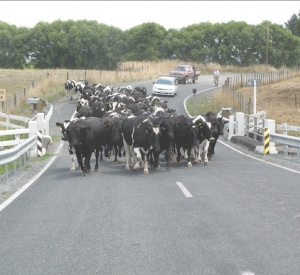DairyNZ chief scientist Dr Eric Hillerton says theileriosis had a big impact on farms last spring, when at least 350 cases were confirmed in Waikato, Bay of Plenty, Northland and central North Island. The disease causes anaemia in cows.
Hillerton says there is a heightened risk now, due to autumn calving, stock movements and recent rain.
“During calving, cows’ immune systems and energy requirements change as they transition to milking and it makes their immune system less efficient and the cows more susceptible to infection,” says Hillerton, who is speaking on theileriosis at the DairyNZ Farmers’ Forum, May 7-8 at Hamilton.
The recent rain and mild temperatures, along with cattle movement in the North Island, are particular risk factors.
“Tick activity will increase, so farmers need to check cattle for ticks and talk to their vet about treatment options if they find them,” says Hillerton. “And with stock moving off-farm to winter grazing and gypsy day looming, there is increased risk of theileriosis spreading to uninfected cattle.”
Stock movement is the most important factor in managing the spread of theileriosis, as infected animals take it to a new location or are introduced to healthy animals.
“The best way to minimise the risk of infection is by good biosecurity including stock management and applying tick control when necessary, especially if moving cattle off-farm or purchasing new cows.”
Hillerton will explain how theileria affects a cow’s body, how to prevent it and what the predictions are for the disease. The forum is free to levy-paying dairy farmers and their staff.
Hillerton says for now, farmers must check for signs of theileriosis, which include lethargy, pale mucous membranes, exercise intolerance and increased respiratory and heart rates.
“Farmers may notice animals lagging behind the rest of the mob when being shifted or lying down in the paddock. The animals are also likely to be off their food and appear hollow-sided.
“Cows with theileriosis should be given rest, high quality feed and water and be handled only when necessary. Farmers should also contact their veterinarian for advice. There is no human health or food safety risks associated with theileriosis.”
Hillerton’s presentation is one of 12 workshops at the forum. It will be one of his last engagements before he retires.
www.dairynz.co.nz/farmersforum
















